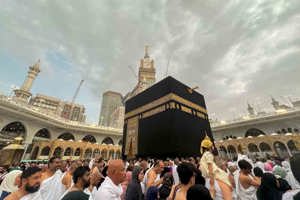Can Pilgrims Perform Umrah Using a Tourist Visa? 2025 Explained
11 Sep, 2025
The question of whether pilgrims can perform Umrah on a tourist visa has become one of the most frequently asked by Muslims around the world. With Saudi Arabia introducing major reforms in its visa policies over the last few years, travelers are keen to know if they can combine religious obligations with the flexibility of a tourist visa. In 2025, the Kingdom has once again clarified its stance, offering updated guidelines for international pilgrims. This article explores the policies, requirements, and implications of performing Umrah with a tourist visa.
Saudi Arabia’s Visa Reforms and Vision 2030
Saudi Arabia’s ambitious Vision 2030 is reshaping not only the Kingdom’s economy but also its approach to religious tourism. Historically, Umrah was only possible through a dedicated Umrah visa issued by licensed agents. However, in recent years, Saudi Arabia has expanded access by allowing eligible foreign nationals to use a tourist visa for performing Umrah.
The government aims to attract 30 million Umrah pilgrims annually by 2030, and broadening visa options plays a central role in reaching that target. By enabling pilgrims to visit the Kingdom on tourist visas, Saudi Arabia is aligning its religious tourism with its broader economic diversification strategy.
Can You Perform Umrah on a Tourist Visa in 2025?
Yes, pilgrims can perform Umrah on a tourist visa in 2025, as Saudi Arabia has continued its policy of allowing Muslims to use this visa type for religious purposes. Unlike the traditional Umrah visa, which was limited in duration and scope, the tourist visa offers greater flexibility with multiple entries, a longer stay of up to 90 days, and the opportunity to explore other Saudi cities alongside performing Umrah. However, travelers must book Umrah permits through the Nusuk app, ensure they meet entry requirements, and keep in mind that this option does not apply during the Hajj season, which requires a separate visa.
Tourist Visa vs. Umrah Visa: Key Differences
| Feature | Tourist Visa | Umrah Visa |
|---|---|---|
| Validity | 1 year (multiple entry) | Up to 30 days (single entry) |
| Stay Duration | Up to 90 days per visit | 30 days maximum |
| Eligibility | Muslims & non-Muslims (but only Muslims can enter holy cities) | Only Muslims |
| Purpose | Tourism + Umrah | Religious pilgrimage only |
| Booking | Umrah permit via Nusuk app | Arranged by approved Umrah operators |
| Flexibility | Allows tourism, business, and family visits | Strictly Umrah-focused |
This flexibility makes the tourist visa a preferred option for many international travelers, especially those wishing to combine spiritual obligations with leisure travel.
Requirements for Performing Umrah on a Tourist Visa (2025)
To perform Umrah on a tourist visa, pilgrims must meet the following requirements:
- Valid Tourist Visa – Must be issued either online (e-visa) or upon arrival, depending on nationality.
- Nusuk App Registration – Pilgrims must book slots for Umrah rituals and Rawdah visits in Madinah.
- Proof of Accommodation – Hotel booking in Makkah or Madinah.
- Return Ticket – Mandatory to confirm departure.
- Health Insurance – Included in the tourist visa fee to cover emergency medical expenses.
- Passport Validity – Minimum six months validity required at the time of application.
Application Process for a Tourist Visa
The process to apply for a Saudi tourist visa is straightforward:
- Online Application via the official Saudi e-visa portal.
- Upload Documents including passport copy, photo, and travel details.
- Visa Fee Payment (approximately USD 117, including insurance).
- Approval usually within 24–48 hours.
- Download Visa and present it upon arrival in Saudi Arabia.
Many nationalities are also eligible for visa-on-arrival, further simplifying access for pilgrims.
Benefits of Performing Umrah on a Tourist Visa
Performing Umrah with a tourist visa offers several advantages:
- Flexibility – Pilgrims can visit multiple cities beyond Makkah and Madinah, such as Riyadh, Jeddah, AlUla, and Diriyah.
- Longer Stay – Up to 90 days per visit allows extended religious and leisure trips.
- Multiple Entry – Pilgrims can enter Saudi Arabia multiple times within a year.
- Simplified Process – No need to rely exclusively on licensed Umrah agents.
Restrictions to Keep in Mind
While performing Umrah on a tourist visa in 2025 offers flexibility, there are important restrictions to keep in mind. The tourist visa cannot be used for Hajj, as pilgrims must obtain a dedicated Hajj visa during Dhul Hijjah. Additionally, only Muslims are allowed to enter the holy cities of Makkah and Madinah, meaning non-Muslim visitors on a tourist visa are restricted to other parts of Saudi Arabia. Pilgrims must also secure a permit for Umrah through the Nusuk app, as entry to Masjid al-Haram and scheduling of rituals are strictly regulated. Overstaying the visa duration or violating these guidelines can result in penalties, so travelers must plan their journey carefully.
Economic and Religious Implications
The allowance of Umrah on a tourist visa in 2025 carries both economic and religious implications for Saudi Arabia and the global Muslim community. Economically, it supports the Kingdom’s Vision 2030 by boosting tourism revenue, creating jobs, and attracting millions of additional visitors who contribute to hospitality, transport, and retail sectors. Religiously, it provides easier access for Muslims worldwide, enabling more people to fulfill their spiritual obligation of performing Umrah. This policy also encourages cultural exchange, as pilgrims can explore Saudi Arabia’s rich Islamic heritage while strengthening their faith. By balancing accessibility with regulations, Saudi Arabia ensures both economic growth and preservation of the sacred pilgrimage’s sanctity.
In 2025, the answer is clear: Yes, pilgrims can perform Umrah on a tourist visa. This policy reflects Saudi Arabia’s efforts to modernize, welcome more visitors, and strengthen its role as the heart of the Islamic world. For pilgrims, the tourist visa offers greater flexibility, longer stays, and the chance to combine spiritual fulfillment with cultural exploration.
As Saudi Arabia continues to refine its visa policies, pilgrims planning their Umrah should stay updated through official channels and ensure all requirements are met before traveling.
Related News
-

15 Sep, 2025 Top-Rated Makkah Hotels with Haram Shuttle Access
Explore the finest hotels in Makkah offering complimentary shuttle services to Masjid al-Haram, ensuring comfort, convenience, and easy access for Umrah and Hajj pilgrims.
read more -

08 Sep, 2025 Essential Guide to Performing Umrah and Hajj
The Essential Guide to Performing Umrah and Hajj provides pilgrims with a clear and simple roadmap to completing the sacred rituals of Islam’s most important journeys. From preparation and Ihram to Tawaf, Sa’i, and the rites of Hajj, this guide helps travelers understand each step, ensuring a smooth, meaningful, and spiritually fulfilling pilgrimage experience.
read more -

04 Sep, 2025 Supreme Hajj and Umrah Committee Reports High Online Registrations for 2026 Pilgrimage (1447 AH)
The Supreme Hajj and Umrah Committee reported a strong surge in online registrations for the 2026 Hajj season (1447 AH), highlighting global enthusiasm for the pilgrimage.
read more -

28 Aug, 2025 What Pilgrims Must Know About Umrah 2025
Stay informed with the latest Umrah 2025 updates, including visa requirements, travel regulations, and key guidelines to help pilgrims plan a smooth and fulfilling journey.
read more -

25 Aug, 2025 Step-by-Step Guide to Applying for an Umrah Visa from Anywhere
A complete step-by-step guide to help you apply for your Umrah visa from anywhere, covering process, requirements, and essential tips.
read more
